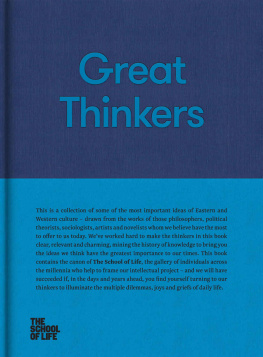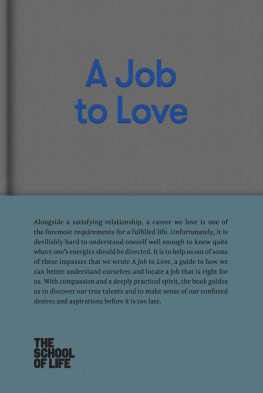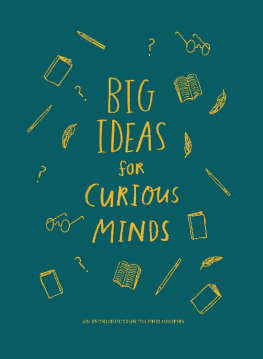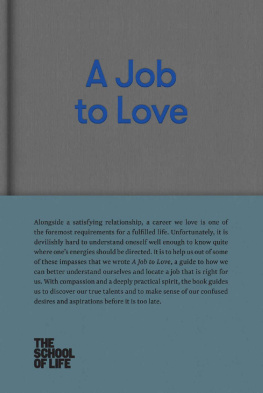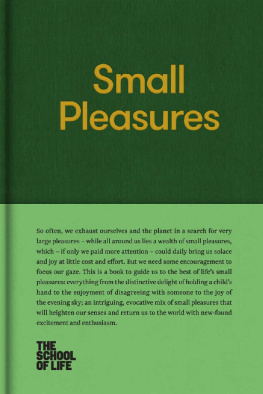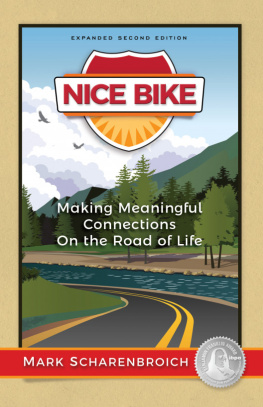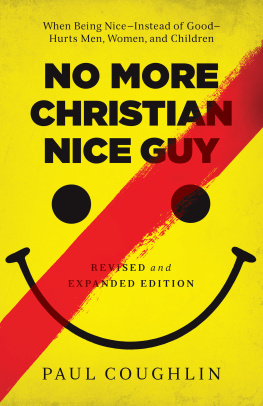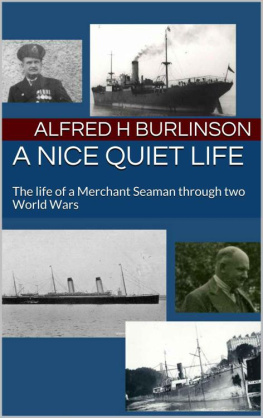The School of Life - On Being Nice
Here you can read online The School of Life - On Being Nice full text of the book (entire story) in english for free. Download pdf and epub, get meaning, cover and reviews about this ebook. year: 2017, publisher: The School of Life, genre: Home and family. Description of the work, (preface) as well as reviews are available. Best literature library LitArk.com created for fans of good reading and offers a wide selection of genres:
Romance novel
Science fiction
Adventure
Detective
Science
History
Home and family
Prose
Art
Politics
Computer
Non-fiction
Religion
Business
Children
Humor
Choose a favorite category and find really read worthwhile books. Enjoy immersion in the world of imagination, feel the emotions of the characters or learn something new for yourself, make an fascinating discovery.

- Book:On Being Nice
- Author:
- Publisher:The School of Life
- Genre:
- Year:2017
- Rating:4 / 5
- Favourites:Add to favourites
- Your mark:
- 80
- 1
- 2
- 3
- 4
- 5
On Being Nice: summary, description and annotation
We offer to read an annotation, description, summary or preface (depends on what the author of the book "On Being Nice" wrote himself). If you haven't found the necessary information about the book — write in the comments, we will try to find it.
On Being Nice — read online for free the complete book (whole text) full work
Below is the text of the book, divided by pages. System saving the place of the last page read, allows you to conveniently read the book "On Being Nice" online for free, without having to search again every time where you left off. Put a bookmark, and you can go to the page where you finished reading at any time.
Font size:
Interval:
Bookmark:
Most books that want to change us seek to make us richer or thinner. This book wants to help us to be nicer: that is, less irritable, more patient, readier to listen, warmer, less prickly Niceness may not have the immediate allure of money or fame, but it is a hugely important quality nevertheless and one that we neglect at our peril. This is a guidebook to the uncharted landscape of niceness, gently leading us around the key themes of this forgotten quality. We learn how to be charitable, how to forgive, how to be natural and how to reassure. We learn that niceness is compatible with strength and is no indicator of naivety. Niceness deserves to be rediscovered as one of the highest of all human achievements.

Setting out to try to become a nicer person sounds like a deeply colourless and dispiriting ambition. In theory, we love niceness, but in practice, the concept appears to be embarrassingly anodyne, meek, tedious and even sexless. Being a nice person sounds like something we would try to be only once every other more arduous and more rewarding alternative had failed.
Our suspicion of niceness may feel personal, but it has a long history, bearing the sediment of at least four major cultural currents that we should try to understand:
For centuries, Christianity was the single most powerful force shaping our intellectual horizons, and it was profoundly committed to promoting niceness to the world. With the finest aesthetic and intellectual resources, it sang the praises of forgiveness, charity, tenderness and empathy.
But unfortunately for niceness Christianity didnt simply leave it there. It also suggested that there might be a fundamental opposition between being nice and being successful. Successful people, believers were told, were not, on the whole, very nice people and nice people were not, on the whole, very successful. It seemed that applicants to the Kingdom of Heaven had a choice to make: niceness or success.
This dichotomy deeply tarnished the appeal of niceness to anyone with the faintest spark of healthy, worldly ambition in their hearts. Christianity might have been striving to enthuse people about niceness, but by connecting it up so firmly with failure, it created an enduring feeling that this quality was chiefly of interest to losers.
For the last 200 years, we have been heavily influenced by the cultural movement known as Romanticism. For the Romantics, the admirable person has been synonymous with the exciting person: someone intense and creative, mercurial and spontaneous; someone who might upset tradition and dare to be forceful, or even rude, while following the call of their own hearts.
The diametric opposite of this heroic figure was, for the Romantics, someone mild and respectable, guarded and conservative, unflashy and quiet: in other words, the boring person. Here, too, there has seemed a radical choice to be made: either fiery, unpredictable and brilliant; or meek, conventional and in bed by nine.
To this charge sheet of niceness, capitalism added another indictment; presenting an interpretation of the world as a deeply competitive arena in which all companies were committed to forge continuous battle for market share, in an atmosphere marked by ruthlessness, determination and impatience. Those who succeeded had to know how to destroy the competition and handle the workforce without a trace of emotion. A nice person, unwilling to squeeze wages or outwit an opponent, would end up either bankrupt or in the mailroom.
A final, more personal, association hangs over niceness: the belief that the nice cant be sexually desirable, because the qualities that make us sexy are bound up with the possession of brutal, domineering, confident edges at odds with the tenderness and cosiness of the nice. Once again, an awkward choice presents itself: between the pleasant friend with whom to go to the park and the dangerous companion with whom to disappear to the dungeon.
Despite all this, the truth is that we like niceness very much and depend upon it even more. It is just that our true memories of niceness have been suppressed by a culture that unfairly makes us feel unintelligent for lending niceness our approval. All of the qualities we have been taught to think of as opposed to niceness are in fact highly compatible with and, at points, highly dependent upon it.
However much we are committed to success, for long portions of our lives we are intensely vulnerable creatures wholly at the mercy of the gentleness of others. We are only ever able to be successful because other people usually our mothers have given up a good share of their lives to being nice to us.
As for excitement, this too can only be a phase, as all those who have ever made real contributions to humankind know. Quiet days, domestic routine and regular bedtimes are the necessary preconditions of creative highs. There is nothing more sterile than a demand that life be constantly exciting.
For its part, capitalism may reward competition between firms, but it relies on collaboration within them. No company can function long without trust and bonds of personal affection. Much to the frustration of bosses, money cannot guarantee the commitment required from employees in all the more sophisticated areas of the economy; only meaning and a spirit of companionship will.
Lastly, the sexual thrill of nastiness only ever properly entices in conditions of trust. However much we may fantasise about a night with a ruthless conqueror, it would be alarming to wind up with an actual example. We need to know that someone is fundamentally kind before an offer of a rope and the sound of swear words become properly interesting.
So much of what we value is in fact preserved by niceness and is compatible with it. We can be nice and successful; nice and exciting; nice and wealthy, and nice and potent. Niceness is a virtue awaiting our rediscovery and our renewed, unconflicted appreciation.
At its most basic, charity means offering someone something they need but cant get for themselves. That is normally understood to mean something material; we overwhelmingly associate charity with giving money.
The heroes of Christianity are exemplars of such charity. Outside the city, St Francis comes across a poor man. His garments are thin and ragged. Winter is coming on and coats are expensive. The saint is moved to charity and hands over his cloak.
But, at its core, charity goes far beyond finance. It is in our relations with colleagues, friends and family members that charity becomes particularly necessary. Here what we tend to be short of is charity of interpretation: that is, a kindly perspective on the weaknesses, eccentricities, anxieties and follies that we present but are unable to win direct sympathy for.
A charitable soul does the extra work for us. They come forward with explanations of why we behave as we do: they understand enough about our past to have a picture of where our impatience or over-ambition, rashness or meekness come from. They hold in mind what happened with our parents and with the move to another country. They create a picture of who the person in the begging position is that is sufficiently generous and complex as to make us more than just the fool or weirdo, the failure or loser that we might otherwise so easily have been dismissed as.
Font size:
Interval:
Bookmark:
Similar books «On Being Nice»
Look at similar books to On Being Nice. We have selected literature similar in name and meaning in the hope of providing readers with more options to find new, interesting, not yet read works.
Discussion, reviews of the book On Being Nice and just readers' own opinions. Leave your comments, write what you think about the work, its meaning or the main characters. Specify what exactly you liked and what you didn't like, and why you think so.

